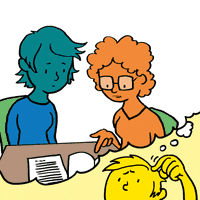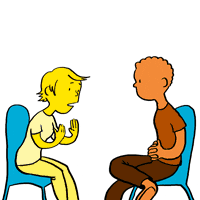When this blog from Janie Scott, a Talking Mats Licenced Trainer with Perth and Kinross Council came in I was a bit stumped. There was a lot that I wanted to highlight but I didn’t want to focus on one thing and detract from others:
- The importance of understanding and applying the Talking Mats framework allowing conversations on topics not covered by our resources.
- Demonstrating how Talking Mats can enable the voice of the child to be heard, upholding Scotland’s Promise to care experienced children, young people, and families.
- A model for embedding Talking Mats in a service.
I decided to go with everything. In 2 parts.
Part 1
Talking Mats; UNCRC, the Promise and hearing the thinker:
Janie Scott, (Highly Specialist SLT Perth & Kinross Council)
Scotland is currently progressing with the incorporation of the United Nations Conventions on the Rights of the Child (UNCRC) through the UNCRC (Incorporation) (Scotland) Bill.1 The UNCRC, article 12, states that, ‘children have the right to give their opinions freely on issues that affect them. Adults should listen and take children seriously.’
Talking Mats enables rights-based participation for children, allowing them to form and express views freely. It allows others to understand the issues and, as stated above, have those views taken seriously 2
The ‘voice’ of the child is central to The Promise3. Talking mats should be considered the ‘scaffolding’ to enable a voice to be heard.

Last year I rolled out Talking Mats foundation training to Social Workers and Senior Social Care Officers working within Services for Children, Young People and Families, in Perth and Kinross Council. Fundamental to Talking Mats is the framework; the ability to use an appropriate top scale, open questions, silence and pass control to the thinker. Having demonstrated the importance of the framework in the training, we then went on to develop symbol sets specifically related to the work of the Social Work teams. These covered a wide range of topics including:
- sleep
- becoming a foster family
- contraception
- sexual knowledge
- contact arrangements,
- behaviours that adopted children think might be difficult to deal with
- grief
- school life
- triggers (related to drugs and alcohol)
I was privileged to hear several reports of how Talking Mats had allowed the voice of the children and young people to be heard which had a direct positive impact on their lives. Here are two powerful examples from a parent and a social worker.

Parent
” I have really enjoyed using Talking Mats. It lets me see everything in an organised way. I really like that. It has also shown me the progress I have made; I have found using an advocate really useful in the past but I don’t need to use an advocate any more as I feel more confident. I used to struggle with making decisions but this mat made me realise that I make decisions all the time and they are not wrong decisions.”
Assessing Social Worker for Kinship Care
“As part of my role, I need to find out information from teenagers on how they feel their kinship placement is going. Typically I find that many teenagers give one word answers or sometimes they tell me what they think I want to hear. Talking Mats has been useful in my work in allowing teenagers to open up. It has also been useful with children who have English as an additional language. The children did speak English, but it made it easier to get their ‘story’ from them.

“There was one particularly quiet and reserved teenage boy who was reluctant to share information. The Talking Mat allowed him to tell me much more than when I had initially questioned him. Through the Mats we were able to distinguish the difference he felt between living at home and living with his kinship carers. The Talking Mat enabled him to express that his kinship carers were open to having discussions with him and talking about his worries whereas his Mum did not want to talk about his worries. this was something that I was able to support him in sharing with his Mum as part of the plan for him to return home.“
To uphold Article 12 services must be proactive in creating opportunities to listen to the voice of the child. Talking Mats is enabling the voices of children, young people and families to be heard in Perth and Kinross. This voice is influencing key decisions in their lives across a variety of forums including the Children’s Hearing System, Kinship Panels, and Child’s Plan Meetings.
- Children’s rights legislation in Scotland: quick reference guide – gov.scot (www.gov.scot) ↩︎
- Can Scotland be Brave – Incorporating UNCRC Article 12 in practice – gov.scot (www.gov.scot) ↩︎
- Foundations of the promise – The Promise ↩︎
Talking Mats Director, Margo MacKay, will be presenting with Laura Lundy, Professor of International Children’s Rights, QU, Belfast on Wednesday 1st of November, 2023 at NHS Education Scotland webinar; ‘The voice of the infant and child; rights- based participation for children and young people’
For more details please see the NES website.
Read ‘Can Scotland Be Brave, Incorporating UNCRC Article 12 in practice here
 Online training login
Online training login 



